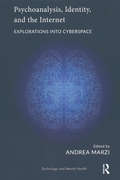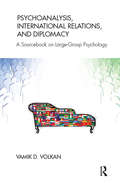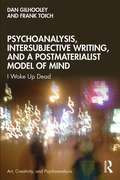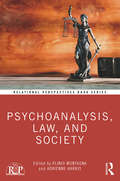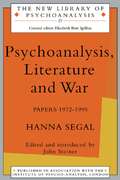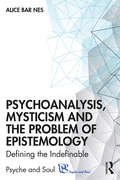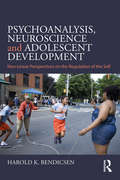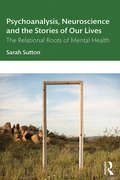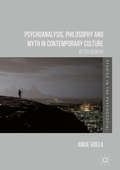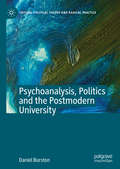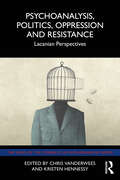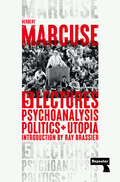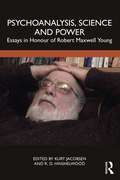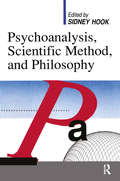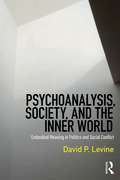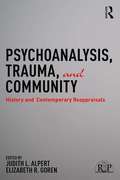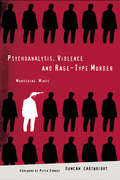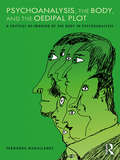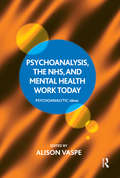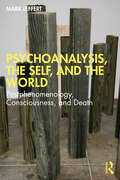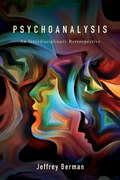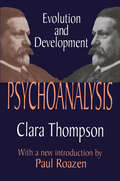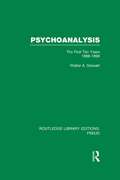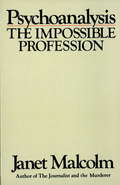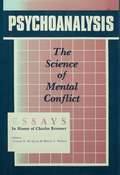- Table View
- List View
Psychoanalysis, Identity, and the Internet: Explorations into Cyberspace (The\library Of Technology And Mental Health Ser.)
by Andrea MarziThe contributors and the articles presented in the book suggest that the main psychoanalytical theories are the most adequate means to understand the nature of the new subjects that appear in the present world on the Internet and cyberspace era. Not only does psychoanalysis read the multifaceted nature of virtual reality, but cyberspace also affects and influences seminal reflections about psychoanalysis itself and the virtual space of the mind. This timely volume, first published in Italian in 2013, explores the consequences of virtual reality in the analytical field and the peculiar characteristics of the encounter with the particular state of mind of internet-addicted patients; it also shows in detail the path of the therapy, psychotherapeutic or analytic, and the path of the analyst with the net-surfer, a castaway in the realm of virtual reality. Considering all the points of view expressed in the book, cyberspace appears, on the one hand, as a mirror that traps vulnerable people in a pseudo-reality, while on the other hand it appears as a particular dimension which sets creative phantasy free.
Psychoanalysis, International Relations, and Diplomacy: A Sourcebook on Large-Group Psychology
by Vamik D. VolkanThe author has three goals in writing this book. The first is to explore large-group identity such as ethnic identity, diplomacy, political propaganda, terrorism and the role of leaders in international affairs. The second goal is to describe societal and political responses to trauma at the hands of the Other, large-group mourning, and the appearance of the history of ancestors and its consequences. The third goal is to expand theories of large-group psychology in its own right and define concepts illustrating what happens when tens of thousands or millions of people share similar psychological journeys. The author is a psychoanalyst who has been involved in unofficial diplomacy for thirty-five years. His interdisciplinary team has brought "enemy" representatives, such as Israelis and Arabs, Russians and Estonians, Georgians and South Ossetians, together for dialogue. He has spent time in refugee camps and met many world leaders.
Psychoanalysis, Intersubjective Writing, and a Postmaterialist Model of Mind: I Woke Up Dead (Art, Creativity, and Psychoanalysis Book Series)
by Dan Gilhooley Frank ToichIn this in-depth and unique collaboration between a patient and his psychoanalyst, Psychoanalysis, Intersubjective Writing, and a Postmaterialist Model of Mind: I Woke Up Dead examines the unconscious mind by analysing the patient’s novel written during his treatment as the focus. Using the patient’s creative writing and their intersubjective relationship as evidence, Dan Gilhooley and Frank Toich show how psychoanalysis fits within a postmaterialist model of mind. In this ground-breaking exploration, Gilhooley and Toich together demonstrate how a nonlocal unconscious can reshape the psychoanalytic conception of the mind. Split into four parts, Intersubjective, Quantum, History and Collaboration, Dan introduces three themes in the first: recovery from death, the intersubjective nature of therapeutic work and the role of creative imagination, combining these themes with analysis of Frank’s work and short, related stories from his own life. Part II, Quantum, introduces the concept of nonlocality to describe the mind and draws on the appearance of quantum physics in Frank’s science fiction, before moving onto Part III, History, which examines the emergence of psychoanalysis out of animal magnetism, looking at rapport, telepathy and love in psychotherapy. Finally, Collaboration discusses their ongoing psychotherapeutic experiment, the role of imagination, dissociation and the cosmic mind in psychological growth. Interweaving creative writing, psychoanalytic theory and real-life stories, the book re-contextualizes the history and future of psychoanalysis. Due to its multidisciplinary nature, this book will appeal to psychotherapists and psychologists in practice and in training. It would also be a vital resource for academics and students of counseling, consciousness studies, psychoanalysis, psychotherapy and psychology.
Psychoanalysis, Law, and Society (Relational Perspectives Book Series)
by Adrienne Harris Plinio MontagnaPsychoanalysis, Law, and Society explores the connections between psychoanalysis and law, arguing that these are required not only for conceptual or theoretical needs in both fields, but also for the vast range of practical implications and possibilities their association enables. The book is divided into four parts, each addressing a unique example of the interaction of legal and psychoanalytic work. It begins with matters that are as global as they are local: the challenge of caring for and aiding migrants, refugees, families, and individuals; the question of planetary survival; of the mistreatment and violence in military and secular conflicts; and the projects and processes of international governance. The middle two parts focus on the very wide-ranging problems of social violence as these target women and people of diversity. Then, on the penetration of law into the most intimate aspects of family life: adoption, divorce, child custody, and complex parental arrangements. In the last part, the contributions use this double vision (legal and psychoanalytic) perspective to explore basic processes in social and legal life. Psychoanalysis, Law, and Society will be of great interest to psychoanalysts, psychoanalytic psychotherapists, as well as legal scholars.
Psychoanalysis, Literature and War: Papers 1972-1995 (The New Library of Psychoanalysis #Vol. 27)
by Hanna SegalMany of the themes which were elaborated in Hanna Segal's earlier work return in this volume of her most recent papers. Two act as connecting strands and give the book its unity: the clinical usefulness of the concept of the death instinct and the relationship between fantasy and reality. A past mistress at capturing the vitality of the clinical session on the page, Segal shows how the same conflicts between life and death instincts, fantasy and reality, are experienced in the consulting room, reflected in literature, and played out by nations in their attitudes to war. Edited by John Steiner, this collection of writings by a leading psychoanalytic thinker provides a rich source of clinical insights and challenging theory for all analysts practising today.
Psychoanalysis, Mysticism and the Problem of Epistemology: Defining the Indefinable (Psyche and Soul)
by Alice Bar NesThis book presents key psychoanalytic theories from a fresh perspective: that of the mystical element. The author explores the depth-structure of central assumptions in psychoanalytic theory to uncover the mystical core of conventional analytic thinking. Exploring authors from Freud and Ferenczi, through Bion and Winnicott, to contemporary voices such as Ogden, Bollas and Eigen, the book shows that psychoanalysis has always operated on the assumption of psychic overlap, a "soul-to-soul" contact, between patient and analyst. Surprisingly, the book shows how this "magical" facet goes hand in hand with a pragmatic worldview that explores the epistemological complexities of psychoanalysis in search of a way to join the subjective, even the mystical, with the practical aim of serving as a validated mental health discipline. This is accomplished through an interdisciplinary and intertextual encounter between psychoanalysis and the innovative pairing of William James’ pragmatic philosophy and Martin Buber’s dialogic thought. The author's paradoxical stance surrounding the nature and role of psychoanalysis and its mystical facet resonate the great challenge embedded in Winnicott's insistence on tolerating paradox and Bion's demand to respect all parts of the (psychoanalytic) truth, in this case, the practical and mundane alongside the mystical and magical. The book’s broad, interdisciplinary outlook will captivate both psychoanalysts and psychoanalytic therapists as well as scholars of philosophy.
Psychoanalysis, Neuroscience and Adolescent Development: Non-Linear Perspectives on the Regulation of the Self
by Harold K. BendicsenPsychoanalysis, Neuroscience and Adolescent Development: Non-Linear Perspectives on the Regulation of the Self explores how psychoanalysis can combine its theoretical perspectives with more recent discoveries about neurological and non-linear developmental processes that unfold during the period of puberty to young adulthood, to help inform understanding of contemporary adolescent behaviours and mental health issues. With the powerful impact of neuroscience research findings, opportunities emerge to create a new paradigm to attempt to organize specific psychoanalytic theories. Neurobiological regulation offers such an opportunity. By combining elements of domains of compatible knowledge into a flexible explanatory synergy, the potential for an intellectually satisfying theoretical framework can be created. In this work, Harold Bendicsen formulates a multi-disciplinary theoretical approach involving current research and drawing on neuroscience to consider the behaviour regulation processes of the mind/brain and the capacities and potential it brings to understanding the development of adolescents and young adults. Psychoanalysis, Neuroscience and Adolescent Development advances Bendicsen’s study of adolescence and the transition to young adulthood, begun in The Transformational Self. It will be of great interest to psychoanalysts and psychoanalytic psychotherapists, as well as psychologists, clinical social workers, psychiatrists and counsellors.
Psychoanalysis, Neuroscience and the Stories of Our Lives: The Relational Roots of Mental Health
by Sarah SuttonPsychoanalysis, Neuroscience and the Stories of Our Lives: The Relational Roots of Mental Health offers a new understanding of identity and mental health, shining the light of twenty-first century neurobiology on the core tenets of psychoanalysis. Accessibly written, it outlines the great leaps forward in neuroscience over the past three decades, and the consequent implications for understanding mental health symptoms today. Central to the book is the idea that the seeds of mental illness are discovered not in the individual’s own fallibilities, but in the complex relationships we experience from our very first moments. Integrating the latest neuroscientific research, it depicts the individual as inherently interdependent with their environment, their neurobiological and emotional foundations framed by the context in which they are raised. Integrating traditional psychoanalytic ideas with findings from neurobiology and neuroscience, it reframes the oedipal set up, examines clinical depression as the presence of absence, and revisits resistance and the neurobiology of denial. Weaving narratives drawn from clinical practice, and highlighting implications for contemporary lives, the book is a tour de force, smashing the myth that our minds develop separately from the world around us. This clear, lucid book, providing a timely overview of emotional and neurobiological development, will appeal to both psychologists and psychoanalysts. It will be also be a key reference work for mental health professionals, particularly those working in early years services.
Psychoanalysis, Philosophy and Myth in Contemporary Culture
by Angie VoelaThis book examines the use of myth in contemporary popular and high culture, and proposes that the aporetic subject, the individual that 'does not know', is the ideal contemporary subject. Using several contemporary novels, films and theatrical plays that illustrate aporia - such as Percy Jackson and the Lightning Thief (Riordan, 2007), Tron Legacy (Koninski, 2010), Welcome to Thebes (Buffini, 2010), The Photographers (Koundouros, 1998), Prometheus (2012) and Prometheus Retrogressing (Sfikas, 1998) - Angie Voela introduces common ground between Lacanian psychoanalysis and some of Freud's most ardent critics, Michel Foucault and Jean Baudrillard, as well as the cultural philosopher Bernard Stiegler. These unprecedented systematic comparisons broaden the scope and impact of Lacanian psychoanalysis in inter-disciplinary debates of philosophy and culture and Voela argues that apart from dealing with the past, psychoanalysis must also deal more explicitly with the present and the future. She presents a unique inquiry into modern subjectivity that will be of great interest to scholars of psychoanalysis, philosophy, film, literature and contemporary culture.
Psychoanalysis, Politics and the Postmodern University (Critical Political Theory and Radical Practice)
by Daniel BurstonCritical theory draws on Marxism, psychoanalysis, postmodern and poststructuralist theorists. Marxism and psychoanalysis are rooted in the Enlightenment project, while postmodernism and poststructuralism are more indebted to Nietzsche, whose philosophy is rooted in anti-Enlightenment ideas and ideals. Marxism and psychoanalysis contributed mightily to our understanding of fascism and authoritarianism, but were distorted and disfigured by authoritarian tendencies and practices in turn. This book, written for clinicians and social scientists, explores these overarching themes, focusing on the reception of Freud in America, the authoritarian personality and American politics, Lacan’s “return to Freud,” Jordan Peterson and the Crisis of the Liberal Arts, and the anti-psychiatry movement.
Psychoanalysis, Politics, Oppression and Resistance: Lacanian Perspectives
by Chris Vanderwees Kristen HennessyThis innovative text addresses the lack of literature regarding intersectional approaches to psychoanalysis, underscoring the importance of thinking through race, class, and gender within psychoanalytic theory and practice. The book tackles the widespread perception of psychoanalysis today as a discipline detached from the progressive ideals of social responsibility, institutional psychotherapy, and community mental health. Bringing together a range of international contributions, the collection explores issues of class, politics, oppression, and resistance within the field of psychoanalysis in cultural, theoretical, and clinical contexts. It shows how, in contrast to this misperception, psychoanalysis has been attentive to these ideals from its origins, as well as demonstrating how it continues to be relevant today, through wide-ranging conceptual discussions of the anti-globalization, Black Lives Matter, and #MeToo movements. Written in an accessible style, Psychoanalysis, Politics, Oppression and Resistance will be essential reading for practicing psychoanalysts as well as academics and students in a range of humanities and social sciences fields.
Psychoanalysis, Politics, and Utopia: Five Lectures
by Herbert MarcuseAn impassioned plea for overcoming capitalism, whose urgency is more timely today than when it was first published fifty years ago.Back in print after fifty years and with a new introduction by Ray Brassier, this often overlooked but prescient collection of Marcuse's lectures makes an impassioned plea for the overthrowing of capitalism.Analysing the work of Freud and Marx, and taking in topics like automation, work, postcapitalism, utopia, and technology, Psychoanalysis, Politics, and Utopia excavates the psychic roots of the current crisis of capitalist civilisation, and gives us a blueprint for the emancipation of humanity from the toils of capitalism.In a world reeling from the ongoing collapse of the neoliberal consensus, coupled with the accelerating pace of catastrophic climate change wrought by capitalism, Marcuse&’s radical insights in Psychoanalysis, Politics, and Utopia are as urgently relevant today as they were in 1970.
Psychoanalysis, Science and Power: Essays in Honour of Robert Maxwell Young
by Kurt Jacobsen R. D. HinshelwoodPsychoanalysis, Science and Power reexamines the current state of psychoanalysis and science and technology studies as they have been influenced by Robert Maxwell Young’s work. Robert Maxwell Young, a Texas émigré to Britain, was a scholar, publisher, TV documentarian, psychoanalytic psychotherapist, journal editor, conference organizer and political activist. Young urged that psychoanalysis, particularly in its Kleinian incarnation, illuminated new aspects of science and technology studies, and vice versa. This volume not only provides an overview of Young’s life and interests by a stellar cast of scholars and practitioners but also commemorates the many and intersecting streams of his contributions, reasoning for their continuing relevance in the contemporary studies of psychoanalysis, biological sciences, technology and Darwinian thought. Presenting perspectives that are rigorously analytical and yet often poignant, Psychoanalysis, Science and Power will be an important read for students, analysts and analytic therapists of all orientations who are interested in broadening their understanding of their practice.
Psychoanalysis, Scientific Method and Philosophy: A Symposium (classic Reprint)
by Sydney HookThis by now well-known pioneering dialogue on Freudian analysis is concerned not with therapeutic implications, individual or social, of psychoanalysis or of any other brand of psychology, but solely with the status of psychoanalysis as a scientific theory. Matching talents with a distinguished group of philosophers and social scientists, psychoanalysts made their claims and willingly subject them to the methodological scrutiny common to the sciences and the philosophy of science. This book records one of the few times in the United States that a distinguished group of psychoanalysts met with an equally distinguished group of philosophers of science in a free, critical interchange of view on the scientific status of the field. While a sense of the event’s excitement is captured here, it also had clear results, such as an expanded notion of psychoanalysis as a scientific theory, and a clear realization that certain elements in psychoanalysis are substantially beyond the boundaries of causal inference or the rules of logic. Two opening statements by Heinz Hartmann and Ernest Nagel set the tone for the debate and discussion that followed. These are followed by social scientific statements of Abram Kardiner, Ernest van den Haag, and Alex Inkeles, followed by the philosophers Morris Lazerowitz, Donald C. Williams, and Anthony Flew. Such distinguished scholars as Adolf Grunbaum, Michael Scriven, Gail Kennedy, Arthur Pap, Philipp Frank. Arthur C. Danto, Max Black and others, round out this pioneering effort in the literature of intellectual combat. Sidney Hook applies to his vision of psychoanalysis the same compelling rigor he applied to other would-be advocates of a science beyond ordinary scientific method or safeguards. He nonetheless points out that even therapeutic success is not the last word, but must itself be tested on a variety of measures: statistical no less than analytical. This remains a courageous and disturbing work, one that commands attention among practicing psychiatrists, psychoanalysts—and their would-be patients.
Psychoanalysis, Society, and the Inner World: Embedded Meaning in Politics and Social Conflict
by David P. LevinePsychoanalysis, Society, and the Inner World explores ideas from psychoanalysis that can be valuable in understanding social processes and institutions and in particular, how psychoanalytic ideas and methods can help us understand the nature and roots of social and political conflict in the contemporary world. Among the ideas explored in this book, of special importance are the ideas of a core self (Heinz Kohut and Donald Winnicott) and of an internal object world (Melanie Klein, Ronald Fairbairn). David Levine shows how these ideas, and others related to them, offer a framework for understanding how social processes and institutions establish themselves as part of the individual’s inner world, and how imperatives of the inner world influence the shape of those processes and institutions. In exploring the contribution psychoanalytic ideas can make to the study of society, emphasis is placed on post-Freudian trends that emphasize the role of the internalization of relationships as an essential part of the process of shaping the inner world. The book’s main theme is that the roots of social conflict will be found in ambivalence about the value of the self. The individual is driven to ambivalence by factors that exist simultaneously as part of the inner world and the world outside. Social institutions may foster ambivalence about the self or they may not. Importantly, this book distinguishes between institutions on the basis of whether they do or do not foster ambivalence about the self, shedding light on the nature and sources of social conflict. Institutions that foster ambivalence also foster conflict at a societal level that mirrors and is mirrored by conflict over the standing of the self in the inner world. Levine makes extensive use of case material to illuminate and develop his core ideas. Psychoanalysis, Society, and the Inner World will appeal to psychoanalysts and to social scientists interested in psychoanalytic ideas and methods, as well as students studying across these fields who are keen to explore social and political issues.
Psychoanalysis, Trauma, and Community: History and Contemporary Reappraisals (Relational Perspectives Book Series)
by Judith L. Alpert Elizabeth R. GorenTrauma is one of the hottest contemporary topics within psychoanalysis, whilst many psychoanalysts are increasingly interested in applying their skills outside the traditional setting of the consulting room, especially in response to disasters, wars and serious social issues. Psychoanalysis, Trauma, and Community seeks to correct the misconceptions of what analysts do and how they do it and debunk the stereotype of psychoanalysts stuck in their offices plying their wares on the worried well. <P><P>Bringing together a group of eminent contributors, this volume considers how psychoanalysis may best be expanded to help in social and community settings, to understand these wider issues from a psychoanalytic perspective, and provide clear clinical guidance and clinical examples of how best to work in a wide variety of non-traditional ways. The innovative work featured includes taking testimony, in-situ interviewing, documentary film-making, social activism, ethnic and political conflict mediation, on-site workshops as well as direct clinical interventions. The reader is taken from the Holocaust, Hiroshima and the Vietnam War to the Balkan Wars and Palestinian-Israeli conflict, from the political violence of the disappeared in Argentina to the devastation wrought by Hurricane Katrina, and from chronic conditions of poverty in India to racism in the post-Jim Crow South. <P><P>Psychoanalysis, Trauma, and Community will appeal to psychoanalysts, psychoanalytic psychotherapists and anyone studying on the increasing number of trauma courses being given today in universities. Lay readers with an interest in the traumatic fallout as a result of chronic conditions or the myriad disasters that occur globally will find this book illuminating. For the non-specialist mental health professional, including non-analytic psychotherapists, social workers and others who work in the community, this book offers concrete advice on dealing with intervention issues such as entry and integration, as well as on management of multiple and complex trauma in a non-clinical setting.
Psychoanalysis, Violence and Rage-Type Murder: Murdering Minds
by Duncan CartwrightWhat turns an apparently 'normal' individual into a killer?Many people who commit "rage type" murders have no history of violence. Using psychoanalytic theory and a number of case studies, this book isolates key psychological factors that appear to help explain why such acts of extreme violence occur.Starting from a psychoanalytic standpoint, Psychoanalysis, Violence and Rage-Type Murder argues for a pluralistic approach to understanding aggression, and claims that the origins of aggression have no single source or cause. Drawing broadly on psychological, criminological and psychoanalytic research the author outlines the clinical features of the act and explores the possible role that psychopathology and personality might play in the build up to murder. These observations raise a number of questions about the so-called 'normality' of the individual alongside the capacity to commit murder, and how we might understand the stability of such offenders. Psychoanalysis, Violence and Rage-Type Murder will be of great interest to psychotherapists, forensic psychotherapists, psychoanalysts, psychologists, criminologists and health care workers.
Psychoanalysis, the Body, and the Oedipal Plot: A Critical Re-Imaging of the Body in Psychoanalysis
by Fernanda MagallanesPsychoanalysis, the Body, and the Oedipal Plot is a new radical departure in psychoanalytic exposition. An attempt is made to convey, in a language accessible for people from different disciplines, some of the most difficult processes that conform our subjectivity and our concept of difference and alterity. Containing both significant theoretical material and applications of the theory to clinical psychoanalytic practice, this book offers the latest thinking on the importance of the body in psychoanalytic theory. Psychoanalysis, the Body, and the Oedipal Plot will be of interest to psychoanalysts, philosophers, and cultural theorists.
Psychoanalysis, the NHS, and Mental Health Work Today (The Psychoanalytic Ideas Series)
by Alison VaspeThis book illustrates the distinctive psychoanalytic contribution to mental health services for children, young people, and adults, with detailed case vignettes illustrating therapeutic treatment and the ways in which staff are supported to do work that is frequently difficult and disturbing. Psychoanalytic thinking contributes to effective mental health work on many levels, from Balint's "Flash" technique in the brief GP/patient encounter to the psychiatric medical and nursing care in secure units, where the most challenging patients need to be held. Starting with the historical contribution of psychoanalysis to the NHS in the 1940s, this book goes on to explore two key psychoanalytic concepts that remain highly relevant to the work of mental health: containment and countertransference. The authors include psychoanalysts, psychotherapists, organisational consultants, consultant psychiatrists, and a leading practitioner in the field of primary care.
Psychoanalysis, the Self, and the World: Postphenomenology, Consciousness, and Death
by Mark LeffertThis book takes psychoanalysis into the 21st century, examining issues of existentialism, postphenomenology, social media, and death and death anxiety that have gone largely ignored in the psychoanalytic and psychotherapeutic literature. Using an interdisciplinary perspective, Leffert explains that it is impossible to close the door of the consulting room. The therapeutic relationship is invaded by the outside world and its relationships for both patient and therapist and cannot be isolated from these influences. Drawing on richly detailed case studies, Leffert demonstrates how the internet, social media, and the metaverse have changed and expanded the self in ways that could not have been imagined in the last century. In turn, Leffert acknowledges recent advances in the neurosciences, and addresses the lack of engagement with their implications for theories and practices of therapeutic action. Finally, the ways in which death and death anxiety impinge on the self, which have also gone mostly undealt with in psychoanalytic literature, become an important focus of this book. As a novel exploration of interdisciplinary connections, this book will be of use to both scholars and practitioners of psychotherapy, psychoanalysis, social network theory, philosophy, and neuroscience.
Psychoanalysis: An Interdisciplinary Retrospective
by Jeffrey BermanPsychoanalysis: An Interdisciplinary Retrospective offers in-depth discussions of and conversations with six psychoanalytic writers: Christopher Bollas, Nancy Chodorow, Sander L. Gilman, Adam Phillips, and Allen and Joan Wheelis. All are genuinely interdisciplinary in their work, bridging multiple cultural and professional positions, but all are deeply rooted in the humanities. They are all also highly controversial, challenging and critiquing conventional psychoanalytic wisdom while also devoting themselves to expanding psychoanalytic knowledge. Drawing on interviews as well as his own readings, Jeffrey Berman examines the continuities and discontinuities in each writer's work while also exploring the interrelationships between psychoanalysis and the humanities. The book ultimately offers a portrait of psychoanalysis as a work in progress, a plurality of visions that might more aptly be termed psychoanalyses.
Psychoanalysis: Evolution and Development (Psychoanalysis)
by Clara ThompsonClara Thompson was a leading representative of the cultural interpersonal school of psychoanalysis, sometimes known as the "neo-Freudians," which included Karen Horney, Erich Fromm, and Harry Stack Sullivan. "Classical analysts" once viewed neo-Freudians with the greatest suspicion and mistrust, yet today they can be seen for the innovative group of thinkers they were. Thompson's Psychoanalysis: Evolution and Development, first published in 1950, remains an enormously fair-minded discussion of the history of psychoanalytic theory and therapy.Psychoanalysis has always been a theory of personality as well as a technique of therapy. Since Freud was born in 1856, and was an outstanding representative of the culture of old Vienna, Thompson thought there was plenty of room for revising classical analytic thinking in light of later developments. Such revisionism, she believed, need not lose the essential appreciation of the dynamic unconscious within classical analysis. However, Thompson felt Freud's biological outlook needed to be supplemented by a culturally more sophisticated orientation, and she was among those who tried to put Freud's concepts of libido into historical perspective. Instead of psychoanalysis having as its objective the release of tensions, Thompson proposed that the goal of analysis ought to be the growth of the total personality. Her revisionism also meant that the scope of psychoanalytic treatment could be broadened well beyond the neuroses Freud sought to explain. Thompson well understood the impact of the social environment on character formation.The psychology of women needed to be rethought; differences between men and women could be partly explained by the social expectations that traditional Western culture had imposed on them. Thompson believed the whole analyst-patient relationship needed to be rethought; the real personality of the therapist has to be acknowledged, and the full human interplay between patient and analyst required examination.In the current positivistic therapeutic climate based on technological advances in psychopharmacology, the ethical and humanistic dimension may be lost. Reflecting on the work of Clara Thompson and the neo-Freudian school can remind us of earlier efforts to challenge therapeutic authority and their distinct relevance to our problems today.
Psychoanalysis: The First Ten Years 1888-1898 (Routledge Library Editions: Freud)
by Walter A. StewartFirst published in 1969, this was a new assessment of Freud’s most creative years and the formative period in psychoanalysis and was the first book to attempt a systematic presentation of Freud’s early ideas, relating them to his later work and to contemporary psychoanalysis. During the years 1888-1898 Freud published 15 papers and one book. In addition many of his ideas were formulated in a series of letters and drafts that he wrote to Dr Wilhelm Fliess. This material provided new insights into the nature of Freud’s creative genius and gave new meaning to his published works. Psychoanalysis: The First Ten Years reviews these early papers, drafts and letters, and describes tentative formulations that, in spite of their value, were not developed further because of lack of time or a shift in interest. As Dr Stewart observes, ‘the study of this aspect of Freud’s work is perhaps the most exciting. Freud’s creativity in these years was remarkable. The ideas he discarded in this short period of time would, for a less gifted person, have been a full life’s work of which he could have been proud.’ There is a good deal of historical and literary interest in his account of Freud’s relationships with Fliess, Breuer and others, but the core of the book is the critical assessment and systematic presentation of Freud’s early major insights, which dramatically reveal a creative genius in the process of discovery.
Psychoanalysis: The Impossible Profession
by Janet MalcolmThrough an intensive study of "Aaron Green," a Freudian analyst in New York City, New Yorker writer Janet Malcolm reveals the inner workings of psychoanalysis.
Psychoanalysis: The Science of Mental Conflict
by Arnold D. Richards & Martin S. WillickOver the course of three decades, in works spanning questions of theory, technique, and clinical practice, Charles Brenner has emerged as one of the preeminent analysts of his generation, a thinker whose probing estimation of mental conflict has promoted the evolutionary growth of analysis as theory even as it has clarified the clinical import of analysis as therapy. In Psychoanalysis: The Science of Mental Conflict, distinguished theorists and clinicians pay homage to Brenner by presenting original essays that converge in their estimation of analysis as "the science of mental conflict." In sections that encompass "The Theory of Psychoanalysis," "The Concepts of Psychoanalysis," "The Technique of Psychoanalysis," "The Clinical Practice of Psychoanalysis," "The Teaching of Psychoanalysis," and "The Application of Psychanalysis," the contributors show how the perspective of conflict - broadened and refined by the clinical findings of recent decades - offers a vehicle for creative theory-building and, as such, a conceptual handle for apprising the indications for, and action of, psychoanalytic therapy. Arnold Richards' comprehensive overview of Brenner's ranging contributions to theory and practice, along with Martin Willick's critical introductions to the various sections of the book, round out a collections whose scope is complimented by its unusual coherence and thematic unity. Taken together, the essays comprising this book present readers with a cogent summary of current psychoanalytic thinking, along with an exciting preview of where it is heading in the future. As such, this volume will be welcomed not only by analysts, but by all mental health professionals who draw on, and learn from, the psychoanalytic assessment of conflict in mental life. It is a work that follows Brenner's own example in promoting the critical understanding of a generation of theorists, clinicians, and educators.
